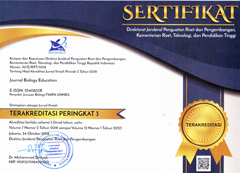The Development Of E-Comic As A Media For Learning Biology Subject In The Psychotropic Material
Abstract
The use of smartphones has been widely used by the public. However, in the field of education teachers have not made optimal use of the online learning process. Electronic comic media (e-comics) can be an interesting choice of learning media for problems experienced by students when online such as low motivation and student learning outcomes, one of which is psychotropic mateeial. The purpose of this research was to analyse the characteristics of e-comic biology learning media on psychotropic material for high school students, analyse the feasibility of e-comic biology learning media on psychotropic material for high school students, and analyse the effectiveness of e-comic biology learning media on student learning outcomes on psychotropic material. The research used a Research and Development (R&D) approach which was tested at SMA Negeri 1 Petarukan on a small scale with 24 respondents from class XII MIPA. While the large-scale trial with 100 students from XI MIPA 4, XI MIPA 5, and XI MIPA 6 respondents. The e-comics that were successfully developed were declared valid by media and material experts with obtaining percentages of 93.6% and 88.8 % which showed e-comics in the very feasible criteria. Student learning outcomes after using e-comics obtained a classical completeness percentage of class XI MIPA 4 of 97%, XI MIPA 5 of 91%, and XI MIPA 6 of 91%. The responses of teachers and students showed positive results, seen from the percentages obtained, namely 94% and 98.6%, which indicated that e-comics were in very good criteria. Based on the results of the study, it can be concluded that e-comic learning media on psychotropic material meet the criteria of being appropriate and effective for use as learning media for high school students.





